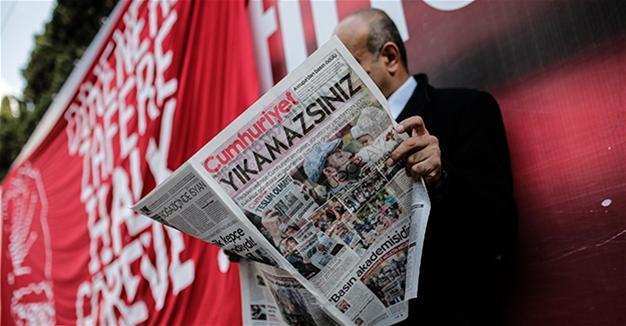Turkey silencing independent media: Human Rights Watch
ANKARA - Agence France-Presse

AFP photo
Human Rights Watch (HRW) on Dec. 15 accused Turkey of “silencing” independent media after the failed July 15 coup attempt.
In a report, the U.S.-based rights watchdog said Turkey’s assault on critical journalism began several years ago and had steadily sharpened since 2014, accelerating further since the attempted takeover.
HRW said journalists it spoke to described “the stifling atmosphere in which they work and about the rapidly shrinking space for reporting on issues the government does not want covered.”
Since mid-July, 140 media outlets and 29 publishing houses had been shut down under regulations imposed under a state of emergency, leaving over 2,500 journalists and media workers unemployed, HRW said.
The state of emergency was extended to another three months in October.
Just one of the emergency decrees involved the closure of 131 media outlets over alleged links to U.S.-based Islamic preacher Fethullah Gülen, who Ankara has accused of masterminding the coup attempt.
HRW said operations did not only affect those with alleged links to the coup-plotters, but also pro-Kurdish media and independent voices critical of the government.
Some 14 such media outlets have been shut down “effectively wiping out all media with a following among the Kurdish minority in Turkey,” the report said.
Accusing the government of using the criminal justice system as a tool against the media, HRW gave the example of the October arrests of 12 senior staff of the opposition daily Cumhuriyet, including its editor-in-chief Murat Sabuncu. They are being accused of committing crimes on behalf of the outlawed Kurdistan Workers’ Party (PKK) and the Gülen movement.
Last year, the former editor-in-chief and the Ankara bureau chief of the daily, Can Dündar and Erdem Gül, were arrested in November 2015, facing aggravated life imprisonments. They were later released in February 2016, after an Istanbul court ruled their rights had been violated.
HRW also flagged physical attacks on journalists, accusing the government of interfering with editorial independence and pressuring outlets to sack critical journalists.
“Keeping 148 journalists and media workers in jail and closing down 169 media and publishing outlets under the state of emergency shows how Turkey is deliberately flouting basic principles of human rights and rule of law central to democracy,” said HRW’s Europe and Central Asia director Hugh Williamson.
HRW spoke to 61 journalists, editors, lawyers and press freedom activists as well reviewing court documents relating to the prosecution and jailing of journalists and media workers.
The report came after Reporters Without Borders (RSF) recently said Turkey had become the “world’s biggest prison for the media profession.” It counted 81 journalists in Turkish jails, prompting a sharp increase in overall detentions of journalists worldwide.
